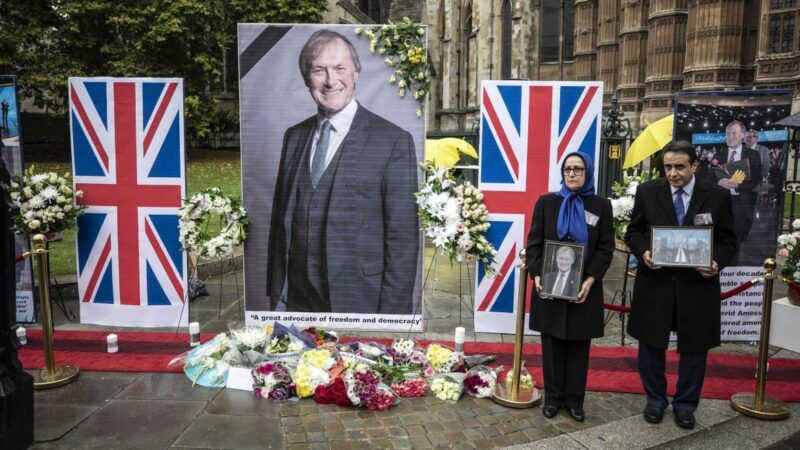Social Media Isn't To Blame for the Deadly Stabbing of a British Member of Parliament
Attempts by British lawmakers to erase online anonymity would lead to radical speech being pushed underground.

British member of Parliament David Amess was stabbed to death Friday, allegedly by a 25-year-old British citizen of Somalian background who might have become radicalized into supporting Islamic terrorism.
The crime is still under investigation, but we do know that the Conservative M.P. wasn't killed by an anonymous comment on Facebook. Nevertheless, a number of politicians have responded to Amess' stabbing by condemning anonymous speech on the internet and proposing regulations to ban it.
British Home Secretary Priti Patel, who is essentially the head of law enforcement and national security, said she's now considering regulations that would potentially force tech companies to hand over to the authorities information about anonymous users. The Independent reports "that any restrictions on anonymity would be 'proportionate and balanced'" according to Patel, "after shadow foreign secretary Lisa Nandy warned she risked catching pro-democracy campaigners and whistleblowers who have a legitimate right to conceal their identities when exposing wrongdoing online."
Parliament is in the early stages of hammering out an "online safety bill" that will force social media platforms to serve as official government censors or face penalties, reports The Guardian. A pre-legislative review is scheduled to conclude in December, after which legislation may formally be introduced.
But what does all this have to do with Amess' killing? At the moment, absolutely nothing. For years, British lawmakers have been trying to force citizens to give up their online privacy in the name of fighting hate speech. Lawmakers want "back doors" to bypass online encryption in order to access citizens' data to fight crime. But many tech and privacy experts have warned repeatedly that this will render people vulnerable to hackers. The British government, much like the U.S. government, will use any crisis as an excuse to push forward aggressive tech regulation even if it has very little to do with the incident at hand.
Interestingly, the suspect, Ali Harbi Ali, had been evaluated at some point in the past through a government program that watches for radicalization and extremism. The Independent reports that he had not been considered a security risk at the time. It may ultimately be the case that the failure to recognize Ali's radicalization was the government's, and that politicians are trying to distract from that revelation.
For a moment, though, let's assume that Ali was anonymously posting radical content online, and that's why he escaped detection. The assumption that stripping anonymity away from Facebook and Twitter will make it easier to catch and stop men like Ali is misguided. Instead, what we'll get is the same thing we get whenever government tries to ban something: black markets. There will most certainly be a black market for anonymous speech fragmented across any number of smaller apps and platforms that the government cannot possibly keep track of.
"Even those who do not face being disowned or fired for their online speech may silence themselves if an identity verification policy is implemented," writes Matthew Feeney, director of the Cato Institute's Project on Emerging Technologies. "Anonymous and pseudonymous accounts allow social media users to explore difficult and complex issues such as politics, race, sexuality, religion, and others without having to fear that comments they make and questions they ask as they seek to learn more will later be used against them."
This is most likely to play out with British authorities trying to make examples of whatever rude posters they can to show that their new anti-anonymity laws "work," while the more dangerous radicalization moves underground where it's harder to catch. And then when another incident like this happens, lawmakers will just say they need harsher laws to prevent this type of behavior.
Beware when any government official says they can determine some sort of objective "balance" when determining the circumstances by which somebody may remain anonymous. It will inevitably skew in favor of punishing those who anger those with the most power.
